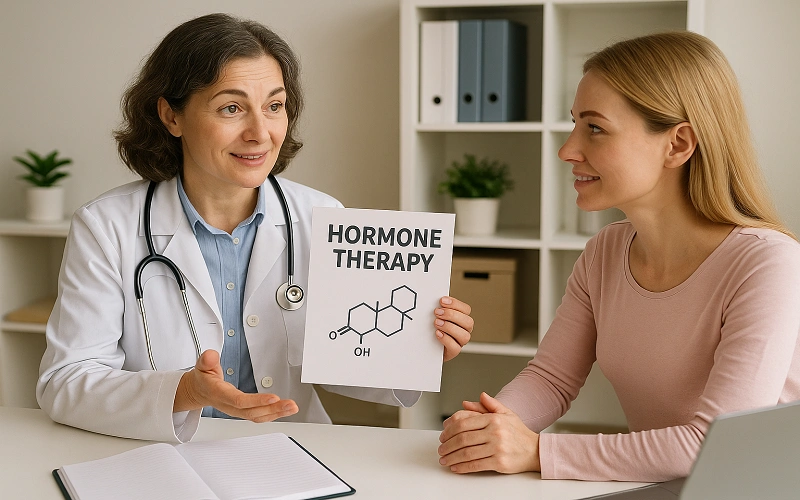Hormone therapy is a medical approach that supplements declining hormone levels, particularly estrogen and progesterone, to address symptoms and changes related to menopause or aging. The practice of restoring hormonal balance has become increasingly personalized, taking into account a woman’s health history and unique needs.
Modern protocols prioritize safety while aiming to extend the benefits of hormone therapy far beyond short-term symptom relief. For women exploring hormone replacement therapy for women, an individualized approach allows for the possibility of improved vitality and reduced risks for several age-related conditions over the years.
Clinical studies and expert panels have established that appropriate hormone therapy is not just for easing hot flashes or night sweats. It has the potential to safeguard overall health, especially when initiated around the time of menopause. By stabilizing fluctuating hormone levels, therapy can help women maintain a better quality of life as they age and face changes in metabolism, mood, and energy.
Protecting Bone Health and Reducing Osteoporosis
One of the most documented long-term benefits of hormone therapy is its ability to support bone density. As estrogen levels drop during menopause, women face a sharp increase in the risk of osteoporosis and related fractures. Hormone therapy has been shown to slow bone loss, maintain or increase bone density, and decrease the likelihood of hip and vertebral fractures.
According to the National Institute of Arthritis and Musculoskeletal and Skin Diseases, timely hormone therapy can be a critical part of osteoporosis prevention strategies for postmenopausal women who are at heightened risk.
These protective effects on bone are most pronounced when therapy is started early in the postmenopausal period. Many women have reported the ability to continue daily activities and maintain independence longer due to stronger bones, highlighting the far-reaching impact of hormone health on overall lifestyle.
Supporting Heart Health Over Time
For decades, researchers have studied the impact of hormone therapy on heart health. While past guidelines were cautious, modern analyses now suggest that when started near the onset of menopause, hormone therapy may offer protective benefits for the cardiovascular system. Early initiation appears linked to improved cholesterol levels, reduction of arterial stiffness, and a lower risk of coronary heart disease, particularly in women under age 60 or within ten years of menopause onset.
Maintaining cardiovascular health is essential for healthy aging. Women considering hormone therapy as part of a heart health plan should consult specialists to assess medical history and weigh the potential benefits for their specific profile.
Cognitive and Brain Health Advantages
Emerging data suggests that hormone therapy may play an important role in cognitive aging and long-term brain health. While research is ongoing, several studies indicate that estrogen replacement, begun near menopause, can offer benefits for memory and mental clarity and even reduce the risk of neurodegenerative diseases such as Alzheimer’s. These effects are thought to be most apparent when therapy is tailored to the timing and dosage that matches individual needs.
Preservation of brain function has become a leading priority as women live longer, more active lives. When combined with regular exercise, cognitive activities, and a nourishing diet, hormone therapy may contribute to mental resilience as women age.
Additional Benefits and Lifestyle Impact
The advantages of hormone therapy can extend to improved sleep, decreased frequency of hot flashes, healthier skin, and better mood regulation. These changes, while sometimes subtle, accumulate over the years and contribute to the overall sense of well-being and self-confidence. Enhanced sleep and emotional stability also foster more engaging social and professional lives, helping women remain vital and connected in later years.
Many women find that hormone therapy supports sustained energy levels and helps with the physical transitions that accompany menopause, allowing for more consistent engagement in hobbies, travel, and family activities. Attention to a healthy lifestyle—balancing nutrition, movement, and stress management—is essential for gaining the most out of this medical approach.
Key Considerations and Reliable Resources
This therapy is not without its complexities, and individualized medical advice is essential for anyone considering its use. Regular follow-up and monitoring ensure safety and effectiveness, adapting the therapy as a woman’s needs evolve. In a rapidly advancing field, staying informed is crucial.
Trusted sources such as the National Institute of Arthritis and Musculoskeletal and Skin Diseases and the American Heart Association are recommended for the latest updates and research findings.
Modern hormone therapy offers many women a path toward healthy, active aging. With personalized care and ongoing education, the long-term advantages become a valuable asset in sustaining good health and vitality throughout life’s later chapters.
